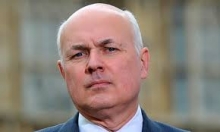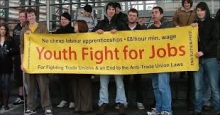Work TV
Watch our TV Channel dedicated to the ‘World of Work’. Explore our video library for informative videos featuring career opportunities at leading companies, franchising opportunities, further education and recruitment professions and their services.
Simon Collyer
Ian Duncan Smith Resigns
Iain Duncan Smith has resigned as work and pensions secretary, according to the BBC denouncing £4bn of planned cuts to disability benefits as "indefensible". He complains of pressure to "salami slice" welfare, saying the latest cuts were a "compromise too far" in a Budget that benefits higher earning taxpayers. David Cameron said he was "puzzled and disappointed" at the resignation.
Earlier, the government had indicated it would look again at some of the proposed disability benefits changes.
Few people believe however, that Iain Duncan Smith's concern are really about the disabled. Smith appeared to have little concern about the disabled as the 'ATOS' era death-toll was mounting. Smith presided of the growth of Foodbanks and a cruel and harsh sanctions system and the DWP's increasingly unfair treatment of a wide range of people. The setting up of a complaints system stacked against the public who bring bona fide complaints against a system that is both unfair and unjust.
The real issue is about Europe and the growing in-fighting behind the scenes as the Tory party threatens to wrench itself apart. Of course with a united Labour Party, confident in its arguments and committed to staying in Europe, the Tories cannot be seen to be split obviously. However, those in the know claim that this is the real reason rather than any profound outpouring of conscience.
Ian Duncan Smith was almost universally disliked and even loathed by so many people. His quitting will be celebrated thought out the land. The world is a better place today with him gone and we should all feel just that little bit happier.
Early Drawing of State Pension
House of Commons
Work and Pensions Select Committee
Committee launches new inquiry on early drawing of state pension
In its report on Communicating state pension age changes, published on 15 March 2016, the Committee called on the Government to explore the option of permitting a defined group of women who have been affected by state pension age changes to take early retirement, from a specified age, on an “actuarially neutral basis.”
This would mean some women could choose to take a state pension sooner than scheduled in return for lower weekly payments for the duration of their retirements. The “reduction factor” used should ensure that, on average, over the lifetimes of the pensioners concerned, there would be no additional pension costs to the exchequer.
The Committee requests written evidence on this possible policy. In particular, it invites answers to some or all of the following questions:
- What would be the short-term and long term fiscal impact?
- What would be the other costs of the scheme?
- Could additional costs be incorporated in the reduction factors used to achieve long-term fiscal neutrality?
- How should the scheme interact with pension credit and other benefits?
- How could uncertainty within the system be budgeted for and managed?
- How are similar schemes managed in occupational pensions?
- Who should be eligible and why?
- How popular would the scheme be among the people eligible?
- What impact would it have on the lives of the people eligible?
ABC: We will keep you posted on that one
Alison Garnham, CPAG Chief - Expresses Budget Disappointment
Responding to today’s Budget, Child Poverty Action Group Chief Executive Alison Garnham said:
“This Budget puts the next generation last and set to be the poorest generation for decades. The Chancellor ignored both the 3.7m children in poverty now and the fact that according to IFS projections we face the biggest increase in child poverty in a generation.
“The Chancellor delivered some big investments for the better off but there was little here for hard-up parents trying to get better off by earning more. Children were prioritised behind business groups who got costly tax cuts.
“Increasing the personal tax allowance is an expensive way to badly target help for the low paid. It is simply not a social justice measure when 85 per cent of the £2 billion the Treasury spends goes to the top half and a third goes to the top 10 per cent. For every £1000 the personal tax allowance goes up, basic rate taxpayers gain £200, but Universal Credit rules will claw back 65 per cent of that gain from the low paid, leaving them only gaining a maximum of £70 a year.
“Improving children’s life chances starts with ensuring families have enough money. That means restoring cuts to Universal Credit – which from April will hit the very same working families as would have been hit by the now abandoned tax credit cuts – and re-investing in children’s benefits.
Extended schools:
“Parents are crying out for more free, quality childcare so that they can work more hours while their children are well looked after. Many parents will welcome the extension to the secondary school day. If are to tackle child poverty and close the attainment gap between low-income kids and their better off peers, we need to see bolder decisions and a bigger investment in childcare so that every family who needs a childcare place can get one.”
Help to save:
“It’s right to help hard-up families to save but in the real world the Chancellor’s universal credit cuts will leave many working parents with nothing extra to put aside. If he wants to help families save the Chancellor should end the discrepancy which leaves Universal Credit claimants subject to far harsher rules on savings compared to their counterparts on tax credits.
“The triple lock on pensioner’s income has achieved huge falls in pensioner poverty. Extending the same protection to children must now be the priority.”
And from Scotland

BUDGET 2016: “Budget sets next generation up to be the poorest for decades” say child poverty campaigners
Responding to today’s Budget, the Director of Child Poverty Action Group (CPAG) in Scotland, John Dickie, echoed those points:
- Child poverty projections:
The IFS projects a 50 per cent increase in relative child poverty – from 17.0 per cent in 2014-15 to 25.7 per cent in 2020-21 – and an increase in absolute child poverty from 16.7 per cent in 2014-15 to 18.3 per cent in 2020-21. The latter will mean that over a decade, the income of families towards the bottom of the income distribution has actually gone down – something without precedent in modern times. The Resolution Foundation’s Autumn 2015 projections suggest 200,000 more children will fall into poverty in 2016/17 as a direct result of measures in the Summer Budget. The projections below are based on income before housing costs are deducted.
| Relative child poverty projections | 2013-14 | 2016-17 | 2020-21 |
| Resolution Foundation | 2.3m | 2.9m | 3.7m-3.9m |
| Institute for Fiscal Studies | 2.3m | 2.7m | 3.6m |


National Pensioners Convention (NPC) Gives Budget Thumbs Down

Youth Employment Up with Inactivity at Record Low
With new statistics released today show that Scotland is again ahead of the UK on employment, with record low rates of inactivity in the workplace.
Labour Market figures, produced by the Office of National Statistics show overall employment rates for Scotland up to 74.5% over the quarter from November 2015 to January 2016 – with 2,631,000 Scots now in employment.
Encouraging figures on youth employment show an increase of 15,000 over the past year, giving Scotland its highest November to January youth employment rate since 2009.
The number of people out of work or not actively seeking work in Scotland fell by 21,000 over the quarter to 701,000 – which at 20.5% us the joint lowest rate of inactivity on record.
Commenting on the figures, SNP MSP Mark McDonald said:
“These are welcome figures showing Scotland leading the UK on employment – and with numbers of people out of work or not actively seeking work at their lowest level.
“We continue to work hard on youth employment – with 15,000 more young people in work over the past year and a determination to do even more on this ambition if elected to serve a third term as Scotland’s government in May.
“The UK government remains unwavering on its course of further austerity as we’ve heard from the Tory Chancellor today. Their ideological agenda risks undermining the hard work of the SNP government in creating jobs and taking positive steps to make work fair.”
In Wales however:
Commenting on the latest unemployment figures, Plaid Cymru Shadow Economy Minister Rhun ap Iorwerth said:
“The drop in unemployment is welcome, but it’s not just about the number but the quality of jobs in Wales. The average wage in Wales is around £100 per week lower than the UK average, and this is indicative of deep-rooted problems in our economy. Plaid Cymru wants to tackle this problem head-on. We will bring forward major investment in transport, energy and green infrastructure and establish a new WDA charged with selling Wales to the world, and attracting investment here from across the world. And we will spend public money more wisely, awarding more contracts to Welsh firms in order to support our own economy and create jobs here in Wales.”
Petition DWP - Telephone Numbers Should Be Free
Iain Duncan Smith: Provide FREE 0800 access to all DWP departments, agencies and public bodies.
People calling the Department of Work and Pensions to deal with their benefits or tax credits should NEVER be charged at premium rates.
Many people who claim benefits - including job seekers allowance, child tax credit, housing benefit and income support - under the new 'Universal Credit' scheme are being forced to use premium rate number if they wish to call DWP about their claim. The number costs between 9p and 40p a minute from a mobile phone.
Individuals having to make contact with the Department of Work and Pensions often have no choice but to do so from mobile phones, and many can't use the service online. This needs to change as it disproportionately affects those who can least afford the charges.
Please sign this petition if you agree that free 0800 numbers should be are provided in ALL cases to contact DWP.
For some people in difficult circumstances these charges could be the difference between spending money on phone calls or spending money to heat your home.
Please sign the petition:
European Employment Improving
Good news on EU unemployment …
The jobless numbers are steadily falling. In the fourth quarter of last year, employment increased by 1.2 percent in the eurozone and by 1 percent in the EU28 compared to the same period in 2014, according to Eurostat. On a quarter-by-quarter basis, Malta and Croatia led the way in adding jobs, while Estonia and the U.K. were among the biggest losers. The full stats are here, sparing you the multiple clicks required by Eurostat to get to the numbers,
ABC: These can be downloaded below.
Other figures are up also: The European fertility rate is growing, but it’s not yet at the levels required to avoid a reduction in population. It was 1.58 live births per woman in 2014, up from 1.46 at the turn of the century but well below the 2.1 babies per mother required to keep the population constant, according to Eurostat. France was the most prolific country with around two kids per woman, while Portugal was at the bottom with 1.23.
Outdated Views Towards LGBT People Endanger Fundamental Rights
Wrong and outdated views towards LGBT people endanger their fundamental rights
In some EU Member States, doctors still view homosexuality as a disease and transsexuality as a mental disorder, according to findings from a new report by the EU Agency for Fundamental Rights (FRA). Such negative views of lesbian, gay, bisexual and trans (LGBT) people in society, among professional groups and policy makers hampers efforts to counter discrimination and hate crime. In the first-ever comparative survey across 19 Member States of the views of public officials, health officials, teachers and police officers, the positive impact of EU initiatives were largely acknowledged. However, they also recognised the lack of information and professional training about the needs of LGBT people prevents them from acting to help counter the discrimination LGBT people continually face.
“LGBT people have the same rights to education, to healthcare and to be treated equally as everyone else. They too have the right to live their life in dignity, free from fear and discrimination,” says FRA Director Michael O’Flaherty. “FRA’s latest findings reveal how some doctors still wrongly believe that homosexuality is a disease. They underscore the need for the EU and its Member States to empower public officials to act on their duty to deliver high quality service to help end the suffering many LGBT people experience.”
Society can be hostile view towards LGBT people and professionals can harbour prejudices, such as believing that homosexuality is a disease that can be caught. This points to the need for more positive EU and national awareness-raising campaigns, such as in the EU’s list of actions to improve respect for LGBT people and their rights.
All professional groups have low levels of awareness and knowledge about LGBT needs. This underlines the importance of professional training, and civil society partnerships and cooperation to help counter prejudice, especially towards trans people in healthcare, and better deliver the same high level of service that most other people enjoy.
The lack of objective information, particularly in schools, can result in bullying and prejudice in later life, and force LGBT youths to hide their sexual orientation/ gender identity. Member States should work with education authorities and schools to formulate targeted campaigns to help make schools a safer and friendlier place for LGBT people.
LGBT hate crime often goes unrecognised, unreported and unrecorded. Member States should make more efforts to ensure the laws guarding against hate crime are properly enacted, and that greater efforts are made to improve LGBT hate crime reporting which should be recorded.
The report surveyed public officials, doctors, teachers and police officers about which laws and policies work and which do not, and why, when it comes to protecting and promoting the rights of LGBT people.
The findings complement the results from FRA’s ground-breaking EU LGBT survey which revealed large-scale fear and discrimination among LGBT people across the EU. The full dataset from the survey will be available later this year.
FRA spoke to the professional groups best placed to identify the barriers and drivers in implementing fundamental rights policies on the ground. Some of the key findings that emerged that can be found in the report below:
ABC you can download the report below: ‘Professionally speaking: challenges to achieving equality for LGBT people’
Live Chancellors Budget Statement
Budget Speech
Wednesday 16 March 2016 Meeting starts at 11.30am Commons Chamber
Following the Prime Ministers Question Time, you can see here the Budget Statement from George Osbourne. With the Euro depreciating due to more quantitative easing the pound and UK exports will appear more expensive. The deficit therefore was greater than anticipated along with a raft of other issues such as the recent fall in the Chinese stock market all indicators of things slowing up in the coming year or two.
Osbourne’s threat is still more austerity cuts and potentially he could skew inequality still further with more tax giveaways to the rich while clamping down on the squeezed middle and decimated poor.
This is the programme:
- Oral questions: International Development, including Topical Questions
- Prime Minister's Question Time
- Financial Statement: Budget Statement
- Adjournment: Commonwealth Games bid for Wales
Craig Williams MP (Cardiff North, Conservative)
Live Debate DWP Select Committee Institutional Fairness
EVIDENCE SESSION: Intergenerational fairness
The Committee holds its next evidence on the question of “intergenerational fairness” tomorrow morning. Check out this infographic short that encapsulates some of the issues the Committee is looking at: https://youtu.be/2ip2pbSZYLQ
The Committee is looking at:
- What ‘intergenerational fairness’ and the concept of a ‘social contract’ between generations mean in practice
- The role of demography and policy in driving disparities between generations
- Whether inequality between generations is a more pressing issue than inequality within generations, and how it should be addressed
- The future of the state pension triple-lock and the long-term outlook for pensions and pensioner benefits
Wednesday 16 March 2016, the Wilson Room, Portcullis House
At 9.30am,
Sally West, Income and Poverty Strategy Adviser, Age UK
Dan Wilson Craw, Policy and Communication Manager, Generation Rent
Ashley Seager, Co-founder and advisory board member, Intergenerational Foundation
Neil Duncan-Jordan, National Officer, National Pensioners' Convention
At 10.15am
Ben Franklin, Head of Economics of an Ageing Society, International Longevity Centre UK
Rachael Saunders, Age at Work Director, Business in the Community
























